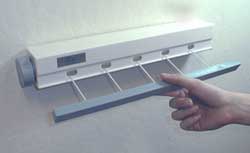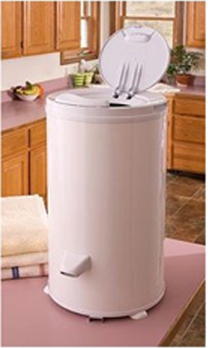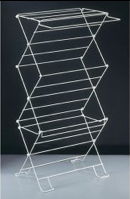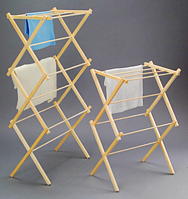Electric vs. Gas Dryers
February 2013
Electric vs. Gas DryersCalculate your Cost Per Load |
||
| |
|
|
| Loads per week |
loads per week | |
|
Energy rate |
/ccf or therm |
|
| Time per load | ||
|
Cost per load |
|
|
| Cost per year |
|
|
The above are
SAMPLE costs! Your own cost will be
different depending on your local rate for
electricity and gas. (It will also depend on how
well your washer extracts water from your clothes, how
long you run your dryer, and what model of dryer you use,
but choosing the correct fuel rates will get you close
enough.) See more on the
cost of electricity, the cost of
gas, and how to misquote
this site. And see the deluxe
laundry calculator to figure the cost of both the
washer and the dryer. Assumptions: 45 minutes per load,
Electric model uses 3.3 kwh, Gas model uses 0.22 therm +
0.21 kWh. Gas model asumes rate in the Electric
column to spin the drum. See sources. |
||
Clothes dryer energy use
Update, 10/23: I clued you in to front-loading washers over 20 years ago. get ready for the next big thing in laundry: heat pump dryers. They use much less energy than traditional dryers, and don't require venting. Downsides: They have smaller capacity and they cost more—for now. As adoption increases, look for both those things to change. (more info)
A clothes dryer accounts for a whopping 12% of electricity use in a typical household. (source) And clothes drying is one of the easiest places to save energy, because you can erase 100% of the cost by simply hanging your clothes up to dry. At a sample rate of $0.15/kWh and 7.5 loads per week, we're talking a savings of $196 per year by line-drying instead of using an electric dryer. That's hefty.How to save energy and cut your costs
If you're determined to use a dryer, there are still other ways to cut your energy use. Let's go over them now. But let's start with the most effective: not using a dryer at all.(1) Don't use a dryer in the first place
Dryers simply aren't necessary. You can easily hang
your clothes up to dry instead. The Japanese are way ahead of
us on that one -- they use most of the modern conveniences we do,
but clothes dryers aren't among them. Even in the luxury
apartments, you'll see the residents hanging their laundry out on
their balconies. I asked my Japanese friend what they do when
it rains for a solid week, and she said, "We just hang the laundry
up inside." (To speed up drying inside, run a
dehumidifier. That'll also keep the inside air from getting
too humid. The energy used by the dehumidifier is far less
than used by a clothes dryer.)
Fortunately, this idea is getting more popular even in the
U.S. Fewer people believe that clothes dryers are a necessity
vs. a few years ago. (Pew
Research, 2009) Drying
outside (vs. inside) is better if possible, since clothes dry faster
and the sun has a sanitizing effect. Tip the Planet has
an excellent
article about air-drying clothes, covering every possible
angle, including clever things like retractable clothes lines.
 (2)
Get a gas dryer, IF gas is cheaper than electricity in your area,
and IF you already have gas service.
(2)
Get a gas dryer, IF gas is cheaper than electricity in your area,
and IF you already have gas service.
If you don't already have gas service, it's usually not worth
getting it just to run a gas dryer vs. electric, unless you gas is way
cheaper than electricity in your area, and/or you have a very
large household. That's because you'll likely pay $10+/mo.
just for the privilege of being a customer of the gas company. And
if you don't have gas lines, installing them will be very
expensive.
If you do already have gas service, your next step is to see if
going with gas would actually net you any real savings. Gas is
often cheaper than electricity, but not always. You can find
your cost for gas and electricity (from your utility bills), enter
them into the calculator above, and then see how much it costs to
run an electric dryer vs. a gas dryer. And to really
see how much your laundry is costing you, see my deluxe
laundry calculator, which includes the cost of both the washer
and the dryer.
Whether or not you save any money by going with gas, it will save
some energy, if conservation is your goal. (Though if
conservation is really your goal, you're probably line-drying your
clothes anyway.) Power plants are only about 37-44%
efficient at turning coal into electricity, so it's more
efficient to use the fossil fuel directly rather than inefficiently
converting it into electricity first. (Gas dryers themselves
are a little less efficient than electric dryers, but the penalty
for getting the electricity from coal in the first place is far
higher.)
(3) When replacing a dryer, get one with a moisture sensor
A moisture sensor shuts off the dryer automatically when your
clothes are dry. So you'll never run the dryer longer
than you have to. Moisture sensors cut energy use by about
15%. (Ca.
Energy Com.) Make sure to clean the sensor
occasionally, too, so that the waxy buildup from dryer softening
sheets doesn't impede its ability to sense moisture. A
temperature sensor is almost as good as a moisture sensor, and will
cut energy use by 10%.

(4)Get a front-load washer
Front-loading washers tend to leave about 7% less water in your
clothes than top-load washers, which means 7% less drying time. (source)
(Front-leaders use a lot less water, too.)
(5) Spin to Win
Run your washer on the fastest spin setting available, to extract
the most water from the clothes, so they'll dry faster. You
can also use a spin
dryer, a little machine that spins your clothes rapidly
to remove excess water (and detergents bonded to the water). After a
couple of minutes in the spin dryer, you put your clothes in a
regular clothes dryer, where they dry 30 minutes faster than usual.
Sample savings are $113/yr. for electric and $67 for
gas. (Based on 7.5 loads a week, 0:20 drying
time instead of 0:50, 15¢/kWh & 1.23/therm, and $3 to run the
spin dryer: 1 washer load = 3 spin dryer loads (Amazon),
3 mins./load, so 9 mins total, at 300
watts.)
(6) Tips on using your dryer
Clean the lint filter after every
load. Your dryer takes longer to dry when it's
trying to push air through lint. A dirty lint screen can mean
30% more energy use. (CA
Energy Com.)
If you use fabric softener sheets, clean
your lint screen with a toothbrush and water occasionally.
Dryer sheets can cause an invisibly waxy buildup on the lint screen
which makes it harder for the dryer to push air through it. (Snopes).
Wash & Dry very early in the morning,
or at night. If your utility imposes a demand
charge, then do your laundry in off-peak hours.
Feed your dryer warm air. The colder the incoming air,
the more energy your dryer will have to use to heat it up. A
cold basement is the worst place for a dryer. The warmer the
place you can put the dryer, the better. (But of course, don't
heat the area the dryer is in just to feed the dryer warmer
air. That will use way more energy than having the
dryer in a cold area.)
Add a wet towel to remove wrinkles.
According to one website (no longer around), if you leave your
clothes in the dryer too long and they become wrinkled, you can
easily cure this by throwing a wet towel in the dryer and drying
again. This saves you from having to either iron all your clothes,
or wash them and dry them all over again.
(7) Run around the house naked
Then you'll have less clothes to wash. (But not if it's so cold
that you'd compensate by turning up the heat, which would more than
negate your savings. On the other hand, if it's summer and this lets
you run the AC less, then you'll save even more.)
Below are questions I've received and answered about how saving on the use of clothes dryers.
Ask Mr. Electricity about saving on dryer costs
Our dryer just quit working today. My husband says if he puts up a clothesline and irons the clothes to remove the wrinkles that it will be much cheaper than using the dryer. But will the iron use negate the savings of the dryer? I have been researching this all day on the net and could not find anything even remotely close until i found your site. Very informative, glad it is there. —Wendy M.
You can estimate the difference yourself like this:
(Dryer wattage) x (Time used) = (Total Dryer Energy)
(Iron wattage) x (Time used) = (Total Iron Energy)
You can find the wattage of each appliance by looking at the label, but this is not so effective for dryers since the rating on the label is the maximum the dryer will ever use, and it typically uses a bit less than that. To find the electrical consumption of your dryer more accurately, see the table above that I just added.
Anyway, when you do the calculations you'll find that using the iron is cheaper. The iron uses less electricity than the dryer per minute of use, and you probably won't run it for nearly as long as you'd run the dryer anyway.
There's another factor to consider: You're also saving the cost of a new dryer if you don't replace it. So using a clothesline and an iron instead of replacing and using a new dryer will definitely save you money.
You're wrong that putting the dryer in a warmer room is more efficient, because cooler air holds less moisture, so putting the dryer in a cooler room like a basement means the incoming air will be drier, so the dryer can more easily extract moisture from the clothes. — gunbo oy
Your dryer works by heating the incoming air, increasing its ability to hold moisture. The warmer the air you feed it, the less it has to heat that air up. If you want to prove me wrong, run your dryer in both the living area and the basement, recording the room temperature and absolute humidity, and measure how much energy is used in each situation. (Me, I don't have a basement.)
Everyone says to run appliances like washing machines and dishwashers at night to save money. Is electricity cheaper at night? — Melissa, Appomattox, VA
Not usually, but it depends on how your utility company charges you
for energy. Some utilities charge less for evening
use, and you can check your electric bill or call your utility
company to find out for sure. It could also pay to run
appliances in the evening when the air conditioning is off if your
utility company has a demand charge. See the next answer
about that.
By the way, one reader asked about a dryer running up the AC bill by
adding heat to your home. The answer is that the impact of
dryers on your cooling bill is nearly non-existent, since almost all
the heat is vented to outside the house. (If all the heat were
contained inside for some reason, it would take you about
1.75 kWh for your AC to remove it, which at 16¢/kWh would cost you
28¢ per load.) (Showing my
work: One dryer load = 15k Btus as per laundry
sources. One ton of AC is 12k Btus/hr as per my cooling
page, so 2.5 tons = 30k Btus/hr, so it takes 30k Btus/hr ÷ 15k
Btus per load = 1/2 hour of AC. A 2.5-ton AC uses 3500w from
my cooling page, so 3.5kW x 0.5 hours = 1.75kwH, x 16¢ = 28¢.)
Does it raise your electric bill to run two appliances at the same time rather than one after the other? Like, say, the washer and the dryer or the oven and the dryer? We have an all electric house and were trying to save money on our electric bill. —Christie
It depends on whether your utility company has a separate demand
charge in addition to the consumption charge. The demand
charge based on the maximum amount of electricity you draw at any
one time. The chart at right from Wisconsin Electric
illustrates the concept. (source, PDF)
The shaded area is how much electricity you used, and you know you
get charged for that. But the black bar on top is the demand, how
much energy you "demanded" at any given point throughout the day. If
your utility company has a demand charge (ask them), then you can
save money by spreading out your electrical use throughout the day.
Running appliances one after the other rather than at the same time
would reduce your demand. And better yet, running them when you're
not using much electricity for other purposes (such as at night when
the air conditioner is off) will reduce your demand even more.







